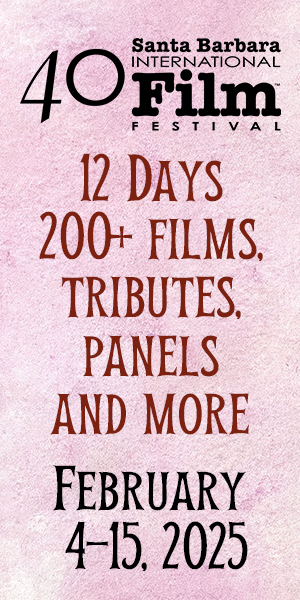Here’s a blink-and-you’ll-miss-it teaser for the trailer for Brad Bird‘s Tomorrowland (Disney, 5.22). The real thing will play during Sunday’s Superbowl telecast. It’ll probably turn out to be a moderately satisfying commercial ride, but like I said on 10.9.14, the hand of Damon Lindelof scares me: “To me, Lindelof attached to a film or TV project constitutes a threat. They don’t mean ‘this movie will be shit’ but they do mean ‘okay, here we go on the fucking inconclusive Lindelof train to Meanderville.’
“After slogging through the frequently infuriating The Leftovers I’m convinced that Lindelof isn’t so much a story-teller as a situational explorer. He’s strikes me as this dorky, bespectacled, comic-book-generation guy who goes ‘Oooh, here’s a cool idea! What if this happened and that happened and then our lead character suddenly realizes…well, let’s not get hung up on resolutions but this is a cool realm…let’s play with it!’
“Lindelof was one of the many architects of Cowboys & Aliens but I’m sure he did what he could to imprint himself upon it, and I hated it. He rewrote Jon Spaihts on Prometheus and I double-hated that one. The Star Trek film he co-wrote was okay, but World War Z was basically a situational zombie slog with no way out, and then came The Fucking Leftovers.
Make no mistake — Mike Binder‘s Black or White is a strong, nervy film that deals fair cards, as Steve Harvey acknowledges in an episode airing on Friday, 1.30. But many critics have slapped it down for, I believe, not saying the right things in the right way. Some are claiming it deals from a stacked deck; what they really mean is that they don’t like the hand. Here’s my Toronto Film Festival review. As I said on 12.3.14, Black or White “wears its emotions a little too plainly at times, but Binder’s script doesn’t slavishly follow the sensitive liberal line about the black-white chasm and the stereotypes that cling to that, and so it’s been thrown under the bus.”
If Ava DuVernay had directed and co-written Black or White and cast Kevin Costner as the lead, would the reception be the same? I suspect that DuVernay’s Black or White would have been saluted and celebrated a hell of a lot more than Binder‘s version has been. The only difference between Binder’s Black or White and DuVernay’s is that Ava would have gone easier on the Reggie character by removing the drug problem and making him an attorney or a doctor. It’s not just the movie these days — it’s the combination of the right movie and the right filmmakers behind it.

I’m a fool for color snaps of famous actors during shooting of renowned black-and-white films. So naturally my heart skipped a beat when I noticed a couple of nights ago that Stevan Riley‘s Listen To Me Marlon uses a few seconds of 16mm color film taken during the Hoboken filming of On The Waterfront in late ‘1953 and early ’54. Riley found the film in the AMPAS library and managed to secure permission to use it. To the best of my knowledge no color images from this 1954 Best Picture winner have ever been seen, much less published, until now. I really enjoyed and admired Listen To Me Marlon — an intimate, fascinating, full-scope portrait that turns rather sad during the final 20 minutes. I also did a quick interview with Riley Tuesday afternoon. More on Thursday.
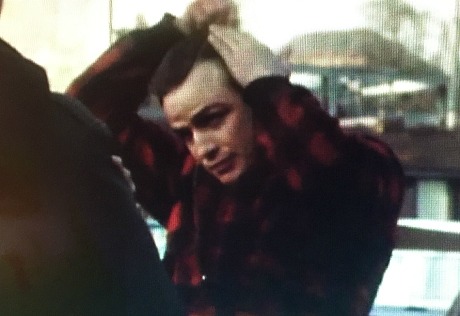
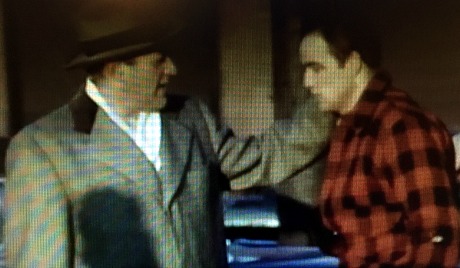
Lee J. Cobb, Brando shooting nocturnal bawl-out scene. The one in which Rod Steiger goes, “It’s an unhealthy relationship!”
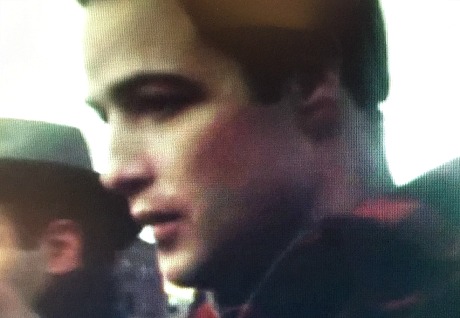
I don’t know much about shooting for black-and-white, but this shot makes it seem as if Brando was wearing a certain degree of makeup (eyeliner, some kind of base or facial smoother). He doesn’t look au natural. His eyebrows have been darkened, intensified.
There is something about dying way too young from some cruel force or circumstance (cancer, car crash, suicide, a Hunger Game) that just floors teen and 20something audiences, and to some extent authors and filmmakers. I don’t know how many YA novels have used this plot element, but movie-wise we’ve had If I Stay, The Fault In Our Stars, The Lovely Bones…a lot of kids buying the farm. Hell, cancer-wise you could go all the way back to Arthur Hiller and Eric Segal‘s crushingly maudlin Love Story. They’ve all been manipulative and overbearing to varying degrees. And now we have Alfonso Gomez-Rejon‘s Me and Earl and the Dying Girl…yes, another one. Lukemia killing a teenaged girl. But this time the material is finagled in a much hipper, somewhat dryer, less maudlin, a lot more clever, Wes Anderson-like form, and it’s not half bad. Much of the crowd seemed to be moved; I was a bit more circumspect. At times I felt the film was behaving in an almost oppressively sensitive fashion. But it doesn’t quite. At times I felt it was too much in love with the main character’s (i.e., Greg Gaines) sensitivity and the way his heart is slowly cracking as a pretty girl named Rachel, with whom he’s fallen in love, slowly succumbs. But most of the time it holds back just enough. The youngish Gomez-Rejon is a gifted and inventive filmmaker who prays at the church of Criterion — he has a deep and abiding worship of movie lore — and he weaves his hip-film-nerd sensibility into Jesse Andrews‘ screenplay (based on his 2013 novel of the same name). I’m not sure I want to see this film again because on some level it almost felt like a chore. Please. But it’s definitely the smartest and coolest and arty-doodliest film about a cancer-afflicted teen that I’ve ever seen. Damning with faint praise? No, but Me and Earl and the Dying Girl is what it is. I have to catch the Jared Hess film at 6:30 pm…25 minutes from now. I’ll expand on this later.
Aside from a relatively short list of stand-out narrative features, for the most part Sundance ’15 has been a festival of great docs, particularly Alex Gibney‘s Going Clear, Morgan Neville and Robert Gordon‘s Best of Enemies and — my personal favorite — Doug Tirola‘s Drunk Stoned Brilliant Dead — The Story of the National Lampoon. A generally hilarious history of a great magazine and a period of inspired anarchic subversion, it’s essentially about the birth and shaping of the irreverent mindset that has defined American comedy for the last 40 years, or since the debut of NBC’s Saturday Night Live (’75), National Lampoon’s Animal House (’78) and National Lampoon’s Vacation (’83). But the magazine and its half-demented staffers were the finest and most outrageous expression of this, and Drunk, Stoned is an absolutely vital history lesson for under-35s who’ve never read any National Lampoon issues or sunk into the mythology. I don’t know what the distribution picture is, but I could see this film again right now. It captures the whole saga in one swift, punchy, well-finessed package.
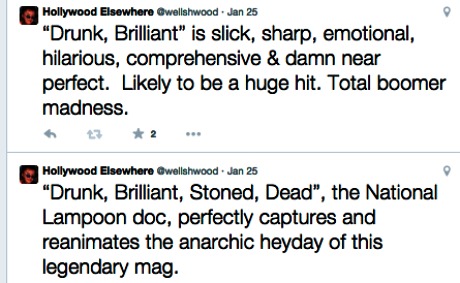

Any film by noted British documentarian Adam Curtis is worth carving out the time to see. I’ve raved over the last decade or so about his two landmark docs, The Century of the Self and particularly The Power of Nightmares. which introduced an idea that the anti-western Islamic terrorists and the neocon hardliners are almost identical in their purist fervor, and are pretty much cut from the same philosophical cloth. Now comes Curtis’s Bitter Lake, which popped in England last weekend and is now viewable on YouTube. The Guardian‘s Sam Wollaston has called it “a story full of violence, bloodshed, and bitter ironies, mainly about how the west, through misunderstanding and oversimplification, repeatedly achieved pretty much the opposite of what it was trying to achieve. America protected Wahhabism through its thirst for Saudi oil, and in doing so helped sow the seeds of radical Islam today. In Afghanistan they built dams to irrigate the Helmand valley, making it perfect to sow actual seeds — opium poppy seeds. The past is strewn with patterns, and warnings, if only anyone had bothered looking and tried to understand.”
Today begins my eighth day in Park City and my seventh day of serious Sundance humping (screenings, filings, running around town). I’ve been averaging four films per day but today I have only two — Alfonso Gomez-Rejon‘s much-buzzed-about Me and Earl and the Dying Girl at the Library at 2:30 pm, and Jared Hess‘s highly anticipated Don Verdean at the Eccles at 6:30 pm. Thursday’s schedule looks underwhelming and to be perfectly honest I’m starting not to care that much. If they would arrange for a special p & i Brooklyn screening I’d be there with bells on, but that’s not in the cards. My “fuck it” mentality always kicks in around the seventh day of any festival. Let’s see what what happens.
DataLab‘s Harry Enten has reported that the ridiculous New York blizzard hysteria of the last two or three days was due to an over-reliance on the European Center for Medium Range Weather Forecasting. Late Sunday evening less excitable data came out of the SREF, or Short-Range Ensemble Forecast. “Five of the 21 models in the SREF [predicted] less than 10 inches of snow falling,” Enten summarizes. “Nine of the 21 predicted a foot or less. Only eight could have been said to support 18 or more inches of snow in New York City. By Monday afternoon, 11 of the 21 members were on the 10-inches-or-less train. Eight of the 21 still supported big-time snow, but they were a minority.”


Daniel Espinoza‘s Child 44 (Lionsgate, 4.17) is a serial-killer thriller set during the Stalinist chill of 1953 Soviet Russia. Tom Hardy, Gary Oldman, Noomi Rapace, Charles Dance, Jason Clarke, Vincet Cassell. Filmed in Prague, Ostrova and Kladno in Czech Republic. Based on novel by Tom Rob Smith; screenplay by Richard Price. Boilerplate: “A disgraced member of the military police investigates a series of nasty child murders,” et. al.
During my 20-odd years of attending the Sundance Film Festival I’ve demonstrated an uncanny instinct for missing at least one or two major-buzz films. Two days ago I decided to catch a 6 pm press screening of Stevan Riley‘s Listen To Me Marlon instead of a 6:30 pm showing of John Crowley and Nick Hornby‘s Brooklyn…mistake. It was announced last night that Fox Searchlight has acquired Brooklyn, a period romance starring Saoirse Ronan, Domhnall Gleeson, Emory Cohen, Jim Broadbent and Julie Walters. Pic allegedly does the thing (“Despite its familiar structure it’s a thing of beauty, a delicate, tender period piece about nice people trying to do their best,” said N.Y. Post critic Kyle Smith) and looks like a fall awards-contender. No more screenings between now and Friday morning, which is when I leave. I’ll probably wind up catching it in Telluride/Toronto next September.
Warner Bros.’ decision to secretly screen Andy and Lana Wachowski‘s Jupiter Ascending (opening 2.6) last night at Park City’s Egyptian theatre didn’t turn out all that well. The Egyptian is a small theatre but the crowd was far from capacity, according to Variety and a couple of tweets, and all were forbidden from reviewing until next week. The elf-eared “space opera” is anything but a typical Sundance-type film, and everyone has been presuming all along that it’s some kind of problem movie so why show it here in the first place? A fair number of Sundance-attending press weren’t invited, were turned away at the door or didn’t even know about the screening, to go by several conversations I had last night.
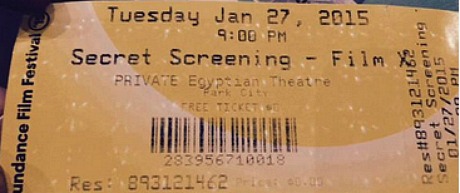
From Variety‘s Ramin Setoodeh: “Despite the hype of a secret Jupiter Ascending screening, clusters of seats inside the 300-person venue remained empty, and a handful of patrons walked out” — bailed! — “of the two-hour-plus space epic starring Mila Kunis as a princess and Channing Tatum as an intergalactic soldier tasked with rescuing her.
“The Wachowskis’ flair was fully on display, with sequences reminiscent of The Matrix or Star Wars. But when the film ended, the usually gracious Sundance audience didn’t clap at the closing credits.
“‘I hated it,’ said one of the festival’s volunteers, who asked not to be identified for fear of irking Sundance. ‘It’s just ridiculous.’

 Really Nice Ride
Really Nice RideTo my great surprise and delight, Christy Hall‘s Daddio, which I was remiss in not seeing during last year’s Telluride...
More » Live-Blogging “Bad Boys: Ride or Die”
Live-Blogging “Bad Boys: Ride or Die”7:45 pm: Okay, the initial light-hearted section (repartee, wedding, hospital, afterlife Joey Pants, healthy diet) was enjoyable, but Jesus, when...
More » One of the Better Apes Franchise Flicks
One of the Better Apes Franchise FlicksIt took me a full month to see Wes Ball and Josh Friedman‘s Kingdom of the Planet of the Apes...
More »
- The Pull of Exceptional History
The Kamala surge is, I believe, mainly about two things — (a) people feeling lit up or joyful about being...
More »  If I Was Costner, I’d Probably Throw In The Towel
If I Was Costner, I’d Probably Throw In The TowelUnless Part Two of Kevin Costner‘s Horizon (Warner Bros., 8.16) somehow improves upon the sluggish initial installment and delivers something...
More » Delicious, Demonic Otto Gross
Delicious, Demonic Otto GrossFor me, A Dangerous Method (2011) is David Cronenberg‘s tastiest and wickedest film — intense, sexually upfront and occasionally arousing...
More »


